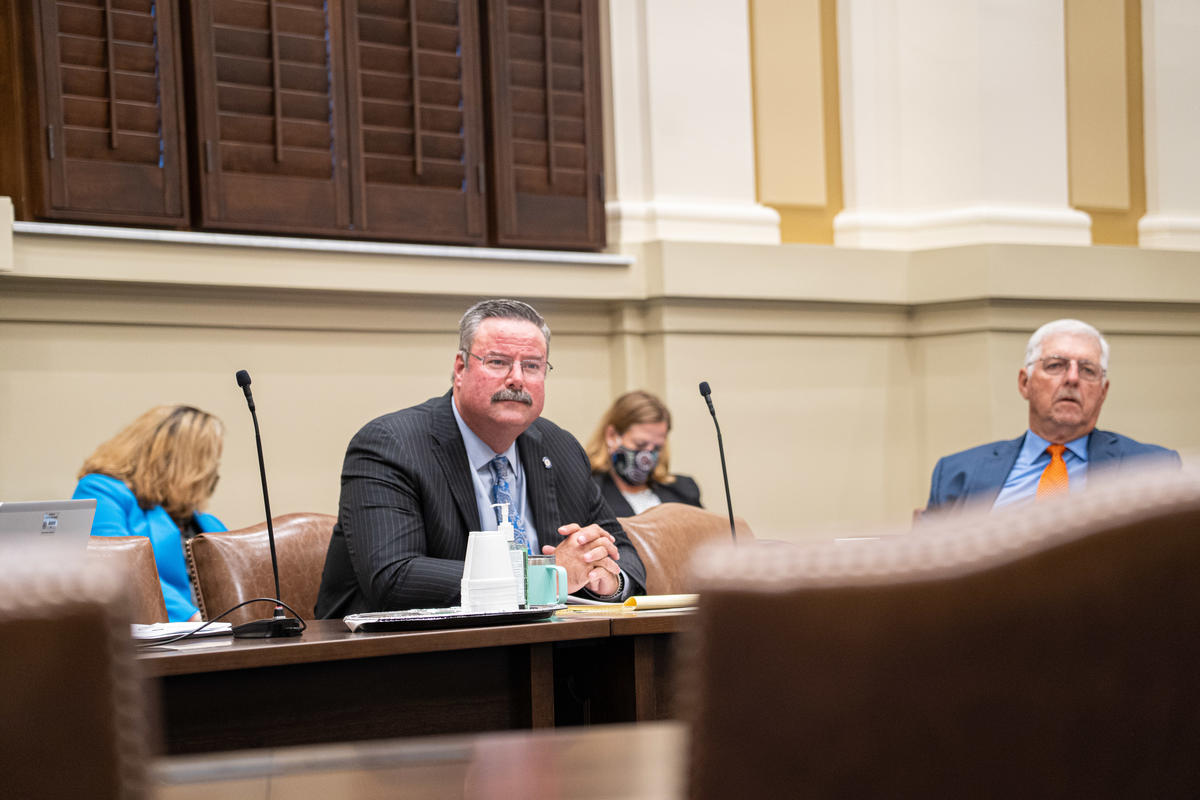In order to provide equal access and equal opportunity to people with diverse abilities, this site has been designed with accessibility in mind. Click here to view
Sen. Murdock holds interim study to examine the rules and regulations on beef processing facilities
 Sen. Casey Murdock, R-Felt, listens to presentations during his interim study about the rules and regulations facing beef processing facilities.
Sen. Casey Murdock, R-Felt, listens to presentations during his interim study about the rules and regulations facing beef processing facilities.
OKLAHOMA CITY – Sen. Casey Murdock says he often sees Oklahoma’s rural towns falling by the wayside due to a lack of opportunity and investment on his drive to the state Capitol. The Felt Republican held an interim study on Monday examining the rules and regulations on beef processing facilities in the state with the belief that increasing investment in these facilities will lead to more jobs and opportunity for rural Oklahoma.
“We need to do more to provide opportunities for our small towns across the state,” Murdock said. “Our rural kids have a tremendous work ethic, but they often grow up and go find jobs in Oklahoma City, Dallas or Denver, for example. My hope is that by investing in the expansion of small packing plants across our state, we will create new jobs and additional opportunities for our children to stay close to home.”
Murdock emphasized that one way to create these opportunities is to invest in local processing facilities across the state that are already operating at peak capacity in recent months due to COVID-19, which has underscored the need for increased packing facility capacity across the state.
In the early months of the pandemic, many grocery stores ran out of beef, pork and chicken due to many national packing facilities closing their doors because of virus outbreaks amongst workers. This left small packing plants across the state with a surge in business, but little to no capacity, facility workers or inspectors to handle the increased demand.
Dr. Rodney Holcomb, Oklahoma State University agricultural economics professor and Charles B. Browning professorship in food science, said local demand for beef products has driven growth and provided an opportunity for small plants, often defined as processing less than 50 head of cattle per day, to flourish in today’s market.
He explained that any packing plant that processes meat for retail sale is required to have an inspector on site each day the plant slaughters. Inspectors require substantial training, and it’s often difficult to find qualified employees that are ready to start working from day one. Holcomb also said it’s also a struggle for packing plants to find and retain employees willing to work in other sectors of the packing and processing facilities.
Jake Nelson, facilities manager/meat processing specialist at the Robert M. Kerr Food and Agricultural Products Center at Oklahoma State University echoed the same sentiments. He explained that work ethic and employee retention were two of the biggest hurdles facing the expansion of meat packers and processors.
However, consumer desire to know the story behind the steak on their plate will continue to drive demand to local “mom and pop” processing shops that are already limited by facility space and a lack of employees, a point also touched on by the Vice President of Governmental Affairs of the National Cattlemen’s Beef Association (NCBA), Ethan Lane.
Lane said states must focus on how to help small facilities expand their capacity moving forward by directing more resources to assist in expansion and employee retention.
Murdock said the study was a starting point to keep the conversation around local packers and processors going into the 2021 legislative session, which will begin in February.
“One interesting thing that came out of this study is that we need to look at providing additional funding to the Oklahoma Department of Agriculture, Food and Forestry (ODAFF) to hire the inspectors these facilities desperately need to operate and increase supply,” Murdock said. “We must address the workforce issue facing these businesses. These are conversations that should be important to all Oklahomans because they directly correlate to increasing future opportunity for our rural towns and students.”
 Oklahoma Senate
Oklahoma Senate

